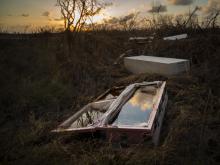- Here's how to get your flooding debris picked up by the City of Houston
- Mosquito activity on the rise due to rainfall, flooding across Texas
- Volunteers help Conroe community clean up in wake of flooding in Montgomery County
- Why leaders are urging NC residents to start hurricane prep now
- Storms could produce hail, damaging winds south of Charlotte
Tropical storm warning issued for Bahamas; system could impact southeast US, NC

The chances of a tropical system in the Atlantic Ocean becoming a tropical depression in the coming days is increasing.
The system could become a tropical depression in the next two days. If it develops, it would be Humberto.
On Thursday at 5 p.m., a tropical storm warning was put into effect for the northwestern Bahamas, excluding Andros Island. A tropical storm watch has also been issued for parts of eastern Florida.
The system currently had winds at 30 mph and was moving northwest at 8 mph. It was about 310 miles southeast of Freeport on the Grand Bahama Island.
A possible track of the storm was released for the first time Thursday evening. The track shows the system developing into a possible tropical storm with winds around 50 mph before it makes landfall in Florida sometime Saturday afternoon.
From there, it’s unclear where the storm could head next, basically because it’s still not clear where the storm will fully form. A couple of tracks has the storm eventually getting to North Carolina sometime next week.
According to WRAL meteorologist Elizabeth Gardner, on Thursday there was a 50 percent chance that the system would develop into a tropical depression in the next two days. There was a 70 percent chance that it could develop in the next five days.
According to Gardner, if the system develops slowly, it is more likely to stay south of the Bahamas, moving west over the Florida Keys into the Gulf of Mexico. This would be better news for the East Coast and the Bahamas.
If the system moves faster, it could be swept northward, following a path similar to Dorian’s. Gardner said the storm could move along the East Coast, potentially impacting North Carolina by next Wednesday.
If the system moves into the Northern Bahamas, it would be a tropical storm, but even that would be devastating after Hurricane Dorian, Gardner said.
“At this point, we don’t be need to concerned, but it is something we are watching closely,” Gardner said. “Keep checking in.”